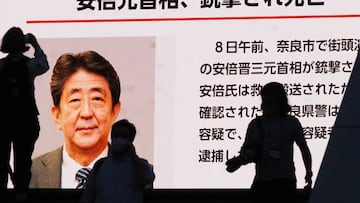Shinzo Abe, the former Prime Minister of Japan, killed in Nara shooting
The former Japanese premier lost consciousness after being shot at a public campaign event and was confirmed dead just hours later.

Japanese public broadcaster NHK has reported that the country’s former Prime Minister Shinzo Abe was killed on Friday after being shot while giving a speech in Nara. Official confirmation is yet to be announced but NHK, also known as the Japan Broadcasting Corporation, is a public news source and one extremely unlikely to misreport such grave information.
Two shots were fired at Mr. Abe, the second of which struck him in the back and sent him to the ground. His attacker, Tetsuya Yamagami - a 41-year-old military veteran, was detained at the scene. Yoichi Masuzoe, a former governor of Tokyo, claimed in a tweet that Mr. Abe, 67, was experiencing cardiac arrest. The phrase is frequently used in Japan before an official death is declared.
“Former prime minister Abe was shot at around 11:30 local time (02:30 GMT) in Nara. One man, believed to be the shooter, has been taken into custody. The condition of former prime minister Abe is currently unknown,” Hirokazu Matsuno, the chief cabinet secretary, informed reporters earlier today.
“We vehemently condemn such a heinous crime and cannot allow it to stand.”
Witnesses report seeing a man with a “big pistol.”
Unverified videos that have been going around on social media claimed to show paramedics gathered around Mr. Abe in the middle of a street. He was apparently taken immediately to the hospital. Witnesses claim they observed a man firing from behind with what they characterized as a huge rifle when Mr. Abe was conducting a campaign speech in Nara.
The second shot seemed to hit Mr. Abe in the back, while the first attempt appeared to miss. He instantly collapsed on the ground while bleeding. The perpetrator was then apprehended by security after making no attempt to flee.
According to police sources cited by local news outlet NHK, Mr. Abe was “awake and alert” while being transferred following the incident. The broadcaster also mentioned that the attacker’s gun had been taken by police, who had also recognized him.
Mr. Abe, who held office in 2006 for one year and then again from 2012 to 2020, was Japan’s longest-serving prime minister when he resigned in 2020, claiming health issues as his reason for leaving office. Ulcerative colitis is an intestine disease, and he later disclosed that he had experienced a return of the condition.
He was succeeded in his position by Yoshihide Suga, a close party ally who was eventually followed in his position by Fumio Kishida.
In Japan, where handguns are prohibited, gun violence is uncommon, and political violence is nearly unheard of.
There were only six gun-related fatalities in Japan in 2014, compared to 33,599 in the US. To purchase a firearm, one must pass rigorous physical and mental health examinations; even then, only shotguns and air rifles are permitted.
The act has received swift condemnation from prominent voices around the world. Former Australian Prime Minister Kevin Rudd called it an “attack on supporters of democracy.”
Rahm Emanuel, the US ambassador to Japan, referred to Mr. Abe as an “outstanding leader of Japan and unshakeable ally of the US,” and added that the US was “praying” for his health.






